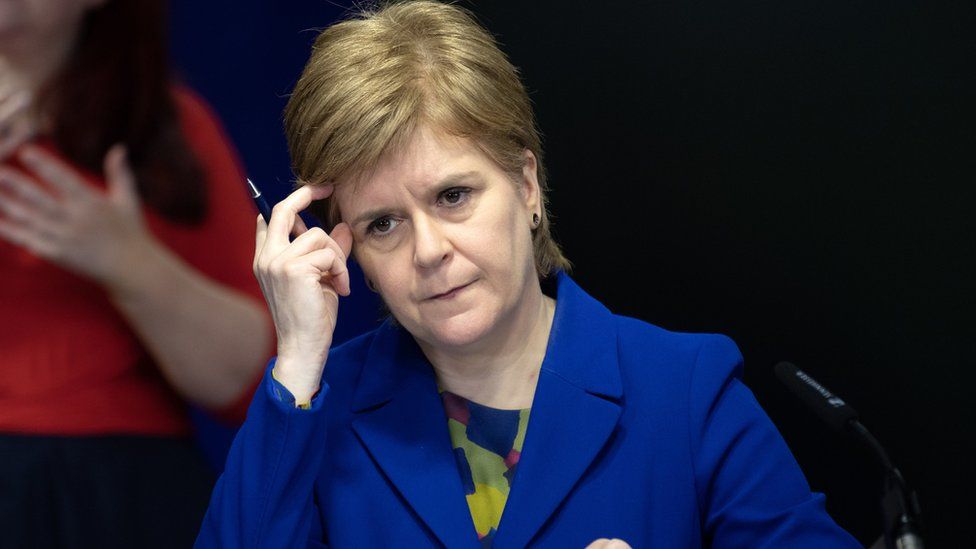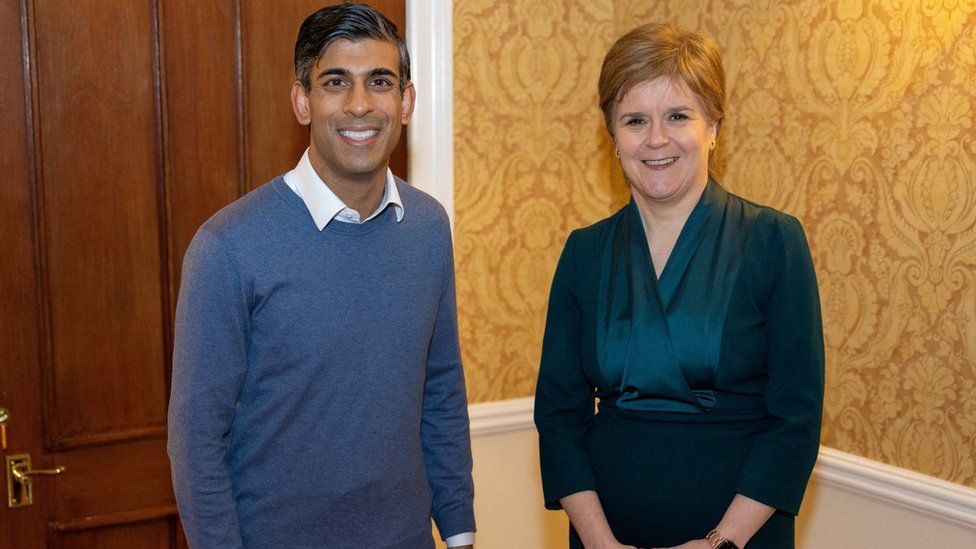The Union has a clash on its hands, writes James Cook, BBC News’s Scotland editor.
 Image source, Reuters
Image source, ReutersJust last week Rishi Sunak was joking with Nicola Sturgeon about stealing the chips that came with her steak at dinner.
The prime minister was said to be on a charm offensive as he visited the Highlands for private talks with Scotland’s first minister.
Now, say Ms Sturgeon’s supporters, the Conservative leader’s true attitude has been revealed in what she calls a “full-frontal attack” on the will of the Scottish Parliament.
Nonsense, say UK government sources, insisting robustly that they have no desire whatsoever for a constitutional clash, and that blocking the Gender Recognition Reform bill passed by Holyrood last month is both essential and purely a matter of procedure.
They point to Scottish Secretary Alister Jack’s stated hope of finding “a constructive way forward”, respecting both devolution and the operation of Westminster legislation.
However, whatever the reason and whomever may be at fault, the fact is we do now have a clash.
In truth, the architecture of devolution set out in the Scotland Act 1998 probably made one inevitable in the end, even if it took a long time to occur.
Surely a day was always going to come when the Scottish Parliament passed a law which UK ministers reckoned stepped on their toes?
The fact that it has arrived, after nearly a quarter of a century, on such a hot-button topic adds an additional layer of jeopardy.
The law passed at Holyrood last month would remove medical, legal and administrative hurdles which must currently be cleared before someone in Scotland can change the sex recorded on their birth certificate. It would also cut the age limit to do so from 18 to 16.
Its opponents have argued that allowing someone, in essence, to self-identify in their gender would impinge on Westminster equalities legislation by, for example, making it more difficult for women-only spaces to exclude people who were born biologically male.
The Scottish National Party (SNP), the Conservatives and Labour are all, to a greater or lesser extent, divided on the merits of the legislation itself. Even some senior figures in the SNP worry that the controversial nature of the subject makes it a risky centrepiece for a “democracy denied” campaign.
There are also concerns within the party hierarchy that the relevant passage of the Scotland Act is narrowly-enough drawn that the UK government might win in the courts.
Section 35 of the law provides for the Scottish secretary to veto Holyrood legislation “as a matter of last resort” if it would have an “adverse effect” on the operation of the law as it applies to matters reserved to Westminster (as opposed to devolved to Holyrood). Gender recognition is devolved. Equality law is reserved.
A successful challenge would involve proving that Mr Jack did not have “reasonable grounds” for believing that there would be such an adverse effect.
If and when they take their case up the Royal Mile from Holyrood to the Court of Session – and perhaps ultimately to the UK Supreme Court in London – those closest to Nicola Sturgeon sound confident of victory.
Even if they lose, campaigners for liberalisation argue that the SNP is placing itself on the right side of history.
A poll conducted for the BBC last year suggested that younger voters were far more likely than older voters to support making it easier to change gender. Oddly enough, polling also suggests higher support for independence among younger voters.
Is this the case of the SNP aligning itself with what it perceives as its future base? Or is that too cynical a view?
In the meantime, Whitehall lawyers may have to consider cancelling their Easter holidays, for this is far from the only issue involving the UK government which looks like ending up in court.
Migrants facing potential removal to Rwanda have been granted permission to challenge the Home Office.

Image source, Reuters
Unions have threatened legal action over plans by the Business, Energy and Industrial Strategy Department to enforce minimum service levels during industrial action, a move which would restrict the right of some workers to strike.
Expanding the powers of the police to tackle public protest in England and Wales also has the potential for a challenge.
That’s a lot of conflict for a government which was supposed to have replaced the turbulence of the Liz Truss and Boris Johnson years with plain sailing.
Will voters approve of tough talking on these controversial topics? Is this the way to win a general election? To secure the union? We shall see.
As for what happens immediately, there are limited options.
The Scottish Secretary suggested the Scottish government could consider amending its law but it is difficult to envisage a draft that would satisfy Mr Jack without gutting the bill of its original purpose. In private, even some on the UK side acknowledge this.
Labour have an interesting role. Sir Keir Starmer’s comments on Sunday with Laura Kuenssberg in which he expressed concerns about the legislation, to the discomfort of many in Scottish Labour, may have provided some political cover for the Tories on the issue.
That in itself is an indication that Labour remains torn, both about the fundamental principles at stake and about the political implications of siding with either the Conservatives or the SNP in a row over gender and the constitution.
In the words of the shadow Scottish secretary Ian Murray: “These issues are too important to be reduced to the usual constitutional fight.” Although Mr Murray knows as well as anyone that the fight has been raging in Scotland for some years, sucking in almost every issue imaginable regardless of its perceived importance.
With that in mind, you can certainly overstate the friendliness between Mr Sunak and Ms Sturgeon in Inverness last week.
After an initial convivial conversation, the meeting quickly turned serious with plenty of disagreement about key issues – strikes, the NHS, renewable energy and more. The two leaders did talk gender but, at that point, the discussion about parliamentary procedure was abstract.
Now it is very real. The stakes have been raised.
This video can not be played